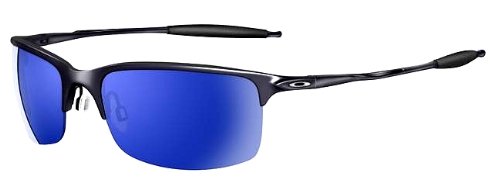Oakley Sunglasses HALF WIRE 2.0
 Decades of Oakley innovation have been awarded more than 540 patents that elevate physics to the level of art. Technologies transcend sports to enhance the lives of consumers, and more than 110 countries now enjoy a full array of market leading products including premium sunglasses, goggles, prescription eyewear, apparel, footwear and accessories. These products represent our commitment to excellence a passion that redefines what is possible for those who defy their own limits.
Decades of Oakley innovation have been awarded more than 540 patents that elevate physics to the level of art. Technologies transcend sports to enhance the lives of consumers, and more than 110 countries now enjoy a full array of market leading products including premium sunglasses, goggles, prescription eyewear, apparel, footwear and accessories. These products represent our commitment to excellence a passion that redefines what is possible for those who defy their own limits.Less expensive connections, like DSL and cable modem, usually residential (and often small busines too), are not guaranteed. It's important to know. Usually the more expensive connections do provide an "SLA," or Service Level Agreement, which spells out the minimum speed, latency, uptime, and other measures of performance, which are guaranteed.
What Every Business Should Know When Shopping For DSL, T1, Or DS3 Bandwidth
Around 2000 companies like TowerStream (beginning in New England, and now nationwide) began deploying business class Internet connections using equipment that, for the first time, was not retrofitted, but designed for the purpose of bidirectional data delivery. These systems also have infinitely variable throttles. TowerStream, for example, delivers a guaranteed T1 speed connection, but they also offer a 2 Mbps, 3 Mbps, 8 Mbps, and other ranges of speeds not offered by the phone companies, and their "DS3," instead of being throttled at 45 Mbps, is rounded off to 50. These connections are also unique because they completely bypass the phone and cable "copper" infrastructure.
The most common bandwidth solutions business choose today center around DSL, T1, and DS3 bandwidth. But to make the right choice for your business there's a few facts you must get straight.
I've heard Verizon on the radio offering "up to 8 Mbps" for twenty dollars a month. At the end of the ad, the guy with the really fast voice came on and stated "speed and uptime not guaranteed." That's the small print, radio version.
What this means is, exactly what it says ... "up to 8 Mbps." Maybe, maybe not. Maybe it'll crawl along at a terribly slow speed. Maybe it'll stop working completely. Maybe it'll go 8 Mbps. Maybe. They provide no guarantee. You certainly can not call and complain if it goes slow. They only said it might go 8 Mbps.
"T1" is a telephone company term that describes a 1.54 Mbps capacity Internet connection. It also implies that the connection is "business class," and includes a guarantee.
The term "DS3" is also a "business class" guaranteed Internet connection. It should not be put together with "DSL," because in general they are not similar. However. many business customers confuse the 2 leading to some avoidable mistakes during the quote and purchase process.
In addition, business class links (like T1's) usually allow the customer to host a server inside his location, and he gets public IP addresses, as well as other means of support, which are generally required for Internet intensive and Internet commerce-based businesses, and businesses which have outside users working from remote locations who need to be able to access the office. Residential type services (the less expensive services) will not provide business support, and often will cut off a customer who attempts to circumvent the basics.
Most other connection "speeds" (more accurately, capacity) offered by the telephone company are a "bundle" of 1.54 Mbps lines. A 3 Mbps link is also referred to as a "bundle" of 2 T1's. Similarly, DS3 is a nickname for a 45 Mbps connection, and is simply a bundle of 30 T1's. Since the cable TV companies began retrofitting their systems to deliver Internet access, these nicknames (T1, DS3, and others) have been borrowed, although the "speeds" originally were derived as a function of the limitations of the telephone company copper wires. Cable company equipment on the other hand can be throttled to any speed for the end user.
What Every Business Should Know When Shopping For DSL, T1, Or DS3 Bandwidth
Years ago, a business class T1 connection was very expensive, in excess of $1000 per month, and was designed to provide reliability to businesses whose use of the Internet was critical (they were willing to pay more for guaranteed reliability). Back in the early days, the alternative was dial-up. T1 prices have come down to the $400 per month range today.

0 Comments:
Post a Comment
<< Home